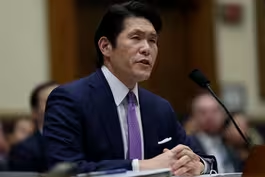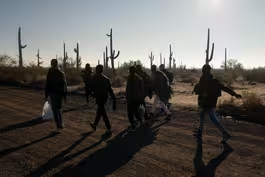
How a seasoned lawyer is forging a new musical path
Clip: 3/12/2024 | 6m 32sVideo has Closed Captions
How a seasoned White House lawyer is forging a new musical path
“Second Act” is a common term which, for some people, means loving your current career but wanting something new. Special correspondent Mike Cerre looks at how a former White House lawyer, federal prosecutor and advisor to four presidents is now forging a musical path for our arts and culture series, Canvas.
Problems playing video? | Closed Captioning Feedback
Problems playing video? | Closed Captioning Feedback
Major corporate funding for the PBS News Hour is provided by BDO, BNSF, Consumer Cellular, American Cruise Lines, and Raymond James. Funding for the PBS NewsHour Weekend is provided by...

How a seasoned lawyer is forging a new musical path
Clip: 3/12/2024 | 6m 32sVideo has Closed Captions
“Second Act” is a common term which, for some people, means loving your current career but wanting something new. Special correspondent Mike Cerre looks at how a former White House lawyer, federal prosecutor and advisor to four presidents is now forging a musical path for our arts and culture series, Canvas.
Problems playing video? | Closed Captioning Feedback
How to Watch PBS News Hour
PBS News Hour is available to stream on pbs.org and the free PBS App, available on iPhone, Apple TV, Android TV, Android smartphones, Amazon Fire TV, Amazon Fire Tablet, Roku, Samsung Smart TV, and Vizio.
Providing Support for PBS.org
Learn Moreabout PBS online sponsorshipGEOFF BENNETT: Second act, it's a common phrase that for some people means loving your first career, but wanting to pursue something else in a new chapter.
Special correspondent Mike Cerre looks at how one seasoned lawyer is now forging a musical path for our arts and culture series, Canvas.
PAULA BOGGS, Singer: Good evening.
everyone.
We are Paula Boggs Band out of Seattle, Washington.
And we're about to serve up some Seattle-brewed soul grass.
MIKE CERRE: Paula Boggs' mix of bluegrass, folk, gospel and jazz, the diversity for many life experiences before starting a new career in her late 50s as a singer-songwriter.
PAULA BOGGS: My life is not a straight line, and often in my life journey, things have come at me from left field, and that has been the impetus for whatever came next.
MIKE CERRE: She learned to sing and play guitar in church choirs while growing up in Virginia and Europe, but had to put her music ambitions on hold when she joined the Army to pay for law school.
That led to her first career in government as a White House staff attorney, a federal prosecutor and adviser to four presidents.
After another major career change to corporate America, she eventually became Starbucks' chief counsel.
HOWARD SCHULTZ, Former CEO, Starbucks: One of our most beloved leaders, Paula Boggs, has decided to retire.
MIKE CERRE: A family tragedy prompted her to leave Starbucks and the law at the height of her career to get back to her music as a way to grieve and to reset her priorities.
PAULA BOGGS: It was a way to try to feel better about something very painful.
Not long after my sister-in-law's death, I came to know about a one-year songwriting course offered by the University of Washington.
And so, for a year, while still Starbucks' general counsel, I took this course.
And, once a week, for three hours, I was part of the community of songwriters.
MIKE CERRE: What's it like being at the top of one profession, in your case, the law, corporate law, to start at the bottom, virtually, with recording, touring, songwriting?
PAULA BOGGS: It's humbling.
It's really, really humbling.
The good thing for me, though, is, this is not the first time I have been thrown into something where I was a rookie.
MIKE CERRE: She started her band in Seattle, which included another lawyer, and had to learn how to arrange and self-record her music compositions with different variations of the band.
The corporate jets and limos of her business where are long gone.
When she tours with the band now, mostly on the West Coast and mostly at small clubs to middle-aged audiences her band is cultivating through public radio stations' airplay and music streaming channels.
PAULA BOGGS: The bias in music is, it's a young person's thing.
So there is suspicion or doubt or whatever when someone like me is clawing to try to make a name for herself.
The music I write, we make isn't going to be everybody's tea.
What I own is for us to be the best at what we do, and whether the audience is one or two or many more than that.
MIKE CERRE: Some of her music addresses issues she thinks the country should be more concerned about, like racial disparities, especially for young Black men.
She believes the richness of her personal history and life experiences, which all songwriters ultimately rely on, can compensate for her late start in the business.
PAULA BOGGS: Whoever receives your music, it becomes theirs.
And whatever story they want to build around this song, they can do that.
The inspiration for a new song and how that unfolds, all of those things are part of this experience.
MIKE CERRE: You have had such success in all your other careers.
What are the metrics for success now as a singer-songwriter starting out a little bit late in life?
PAULA BOGGS: Oh, news flash, I will never be Beyonce, right?
But there's also the measure of, how are you doing compared with how you were doing last year?
MIKE CERRE: Their latest album is probably called "Janus," named after the Greek god for beginnings and endings, which pretty much sums up Paula Boggs' very diverse professional career and her constant search for more meaning in her work.
PAULA BOGGS: I'm not here to tell you I have figured it out.
I'm here to tell you and share with you some of those milestones in my life that have led to what I hope is a more authentic life.
MIKE CERRE: Is the real Paula Boggs now standing on stage?
PAULA BOGGS: Absolutely, and in technicolor.
(LAUGHTER) (MUSIC) (CHEERING AND APPLAUSE) PAULA BOGGS: Thank you.
MIKE CERRE: For the "PBS NewsHour," I'm Mike Cerre in Mill Valley, California.
Biden classified docs special counsel testifies to House
Video has Closed Captions
Clip: 3/12/2024 | 3m 48s | Biden classified documents special counsel testifies in House hearing (3m 48s)
Global migrants make their way to Arizona’s southern border
Video has Closed Captions
Clip: 3/12/2024 | 4m 15s | Migrants from all over the world make their way to Arizona’s southern border (4m 15s)
Haiti gang violence bolstered by trafficked U.S. weapons
Video has Closed Captions
Clip: 3/12/2024 | 10m 17s | Widespread gang violence in Haiti continues bolstered by weapons trafficked from the U.S. (10m 17s)
A look at data as concerns grow around surging violent crime
Video has Closed Captions
Clip: 3/12/2024 | 6m 24s | As concerns grow around surging violent crime, the numbers tell a different story (6m 24s)
SRL speaks with surgeon general on youth mental health
Video has Closed Captions
Clip: 3/12/2024 | 3m 53s | Student Reporting Labs speaks with the U.S. surgeon general on youth mental health (3m 53s)
Why TikTok's parent company may face divestment or U.S. ban
Video has Closed Captions
Clip: 3/12/2024 | 11m 6s | Why TikTok's parent company could face divestment or U.S. ban of the platform (11m 6s)
Providing Support for PBS.org
Learn Moreabout PBS online sponsorship
- News and Public Affairs

FRONTLINE is investigative journalism that questions, explains and changes our world.

- News and Public Affairs

Amanpour and Company features conversations with leaders and decision makers.












Support for PBS provided by:
Major corporate funding for the PBS News Hour is provided by BDO, BNSF, Consumer Cellular, American Cruise Lines, and Raymond James. Funding for the PBS NewsHour Weekend is provided by...






